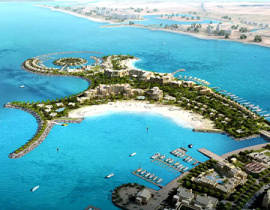Healthcare in UAE: Comprehensive Guide for Expats
Healthcare in the United Arab Emirates (UAE) is highly developed with a robust public and private sector. Expats mainly depend on private medical services, as public healthcare in the UAE is only free in emergencies.
The Ministry of Health and Prevention (MOHAP) oversees the entire healthcare system, with each emirate having its own health authority managing clinics and hospitals.
Quality of Healthcare in UAE: What to Expect
 The UAE boasts a high standard of healthcare, with modern hospitals, advanced technology, and highly qualified doctors.
The UAE boasts a high standard of healthcare, with modern hospitals, advanced technology, and highly qualified doctors.
Many private hospitals have international accreditations, ensuring quality medical care. The country attracts top-tier medical professionals, making it a popular destination for medical tourism.
Health Insurance for Expats in the UAE
The UAE healthcare system for expats offers high-quality medical services. However, expats must have valid health insurance to access medical services beyond emergency care. Health insurance for expats in the UAE is mandatory, with coverage requirements varying by emirate.
Since 2014, under Health Insurance Law No. 11 of 2013, all foreigners entering the UAE must have health insurance. If an expat does not have a valid policy, they cannot enter the country. Employers are responsible for insuring their employees, but in some emirates, dependents are not covered and require separate insurance.
How to Get Health Insurance in UAE?
Healthcare in the UAE is accessible to expats through employer-sponsored plans, private insurance providers, or government-backed options like Dubai’s Essential Benefits Plan (EBP). While employers usually cover their employees, dependents require separate health insurance. Getting a health insurance plan and renewing it on time is essential to avoid fines.
What Does Health Insurance in the UAE Cover?
 Health insurance coverage varies based on policy type. Basic plans, such as the Essential Benefits Plan, cover essential treatments like general consultations, emergency care, and maternity services.
Health insurance coverage varies based on policy type. Basic plans, such as the Essential Benefits Plan, cover essential treatments like general consultations, emergency care, and maternity services.
Comprehensive plans provide broader coverage, including specialist consultations, advanced diagnostics, surgeries, and even dental and optical care in some cases. Coverage also depends on the policyholder’s salary, insurance provider, and plan type.
What are the Costs of Healthcare and Health Insurance in the UAE?
Healthcare options for expats in UAE vary based on coverage level and emirate. It affects overall insurance costs.
- Basic insurance plans for low-income workers start at around 650 AED ($180) per year.
- Mid-tier plans for individuals cost approximately 5,500 AED ($1,500) annually.
- Family insurance plans range from 17,000 AED ($4,630) for basic coverage to 33,000 AED ($9,150) for comprehensive packages.
- High-end private insurance can exceed these amounts.
Can Expats Access Public Healthcare Facilities in the UAE?
Medical services in the UAE for foreigners are accessible through both public and private healthcare facilities. Expats can use public healthcare, but it is not free unless it's an emergency.
Expats need a Dubai Health Authority (DHA) health card to use public hospitals. Public healthcare is generally more affordable than private healthcare, but private facilities are preferred due to shorter wait times and multilingual staff.
What are the UAE Healthcare Trends for Expats in 2025?
 Key trends include increased digitalization, such as telemedicine and AI-driven diagnostics, expanded private healthcare services, and rising demand for specialized treatments. The UAE also focuses on medical tourism. New insurance regulations and increased employer responsibilities are also expected.
Key trends include increased digitalization, such as telemedicine and AI-driven diagnostics, expanded private healthcare services, and rising demand for specialized treatments. The UAE also focuses on medical tourism. New insurance regulations and increased employer responsibilities are also expected.
FAQs
Q: What should expats consider when choosing a health insurance plan in the UAE?
A: Expats should consider factors such as coverage level, hospital network, out-of-pocket expenses, employer contributions, and family coverage options. Additionally, they should compare plans from different providers to find the best balance between cost and benefits.
Q: What are the best health insurance plans for expats in the UAE?
A: The best plans depend on individual needs. Basic plans like the Essential Benefits Plan are cost-effective for low-income workers, while comprehensive private insurance plans offer broader coverage. Popular providers include AXA, Daman, Bupa, and Allianz, offering tailored packages for individuals and families.
Q: Are there any specific health risks expats should be aware of in the UAE?
A: Expats should be mindful of heat-related illnesses due to extreme summer temperatures, respiratory conditions caused by dust and sandstorms, and potential dehydration. It is also advisable to have vaccinations for common illnesses before relocating.
Q: How accessible are specialized medical treatments for expats in the UAE?
A: Specialized treatments are widely available, especially in private hospitals. The UAE has top-tier facilities for cardiology, oncology, orthopedics, and cosmetic surgery. Medical tourism is a growing sector, attracting expats seeking high-quality specialized care.
Q: What are the best hospitals in UAE for expats?
A: Some of the best hospitals in the UAE for expats include Cleveland Clinic Abu Dhabi, Dubai Hospital, Sheikh Shakhbout Medical City, Mediclinic City Hospital, and American Hospital Dubai. These hospitals offer high-quality healthcare with international standards.









